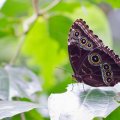PARQUE NACIONAL DE CAHUITA
Cahuita National Park, one of the most beautiful sites in the country with its sandy beaches, its forest and its relatively calm waters.
Declared a national park in 1978, it is the only park in the country that is partly managed by the community and whose entrance fee is left to the appreciation of each visitor. The inhabitants knew how to preserve their way of life, far from the other Ticos who never come there. This is what makes the difference between the southeast of the country and the other coasts, much more frequented. The Cahuita National Park begins at the southern end of the village, and covers 1,067 hectares on land and 22,400 hectares at sea. It is one of the most beautiful places in the country with its white sandy beaches, its coconut palms sloping towards the sea like on a postcard and its relatively calm waters. The main attraction is the coral reef that surrounds Punta Cahuita; unfortunately, it is threatened by the sediments (from the banana plantations) and the pesticides that the Estrella River deposits north of Cahuita. On this reef you can observe sea fans, sea urchins and colored fish, elk horns and cerebriforms...
At the entrance of the park (one as the other), a path leads you from the point to the jungle (4 kilometers). You can reach the other entrance by walking another 4 kilometers, and then return to the starting point, either by cab, by walking on the same path, or (twice as fast) by following the coastal road. If you enter the park from the south of the village, you will walk along the Playa Blanca before arriving at the Suárez River, which flows into the sea. You can then continue to the Perezoso River. In case of rain, the walk is compromised because the rivers swell and it can be complicated to cross them; be careful and stop where nature requires it... In good weather, it is only a formality and you will arrive at Punta Cahuita easily. Another coastal trail will then allow you to walk along Puerto Vargas to the entrance of the same name. Since the beginning of 2017, another trail also allows you to enter the forest in order to get closer to the animals and local flora.
Small tip: it is better to go through the village of Cahuita to avoid paying the entrance to the park. As you will be kindly pointed out, this should not prevent you from leaving a donation, which will be used by the community for the management of the park. The use of a guide is not essential because the paths are well marked out, but it is highly recommended to see the animals. You may have the chance to see howler monkeys, coatis, green ibis, chocuacos... Male howler monkeys make an impressive cry the first time they are heard. A bone in the larynx allows them this particular resonance, which could resemble the barking of a very large dog. It is necessary to go to the park very early in the morning to enjoy it. The sector of Punta Cahuita in Puerto Vargas closes at 2 pm. The bathers will prefer this portion in high season, much quieter than the one accessible from the village. Like many Ticos, remember to bring something to eat.
Swimming is allowed in some places along the Puerto Vargas trail. Elsewhere, beware of the currents, indicated by signs.
It is also possible to dive (with snorkel) around the coral reef by having a local accompany you in a boat. But remember that the rain clouds the water..
Did you know? This review was written by our professional authors.
Book the Best Activities with Get Your Guide
Members' reviews on PARQUE NACIONAL DE CAHUITA
The ratings and reviews below reflect the subjective opinions of members and not the opinion of The Little Witty.


You can see monkeys and slothes and one time I even saw a venomous snake which was really cool.
Entrance to the park is donation based. Be mindful there is no liquor or speakers allowed into the park or beach
Check out faves like Delritas patty after the walk.